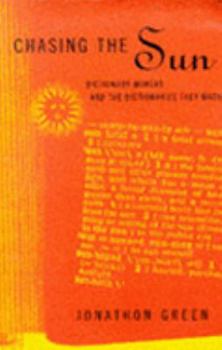Chasing the Sun
Select Format
Select Condition 
Book Overview
Word-collecting is an ancient practice that began nearly 4,500 years ago in pre-Babylonian Sumer. In Chasing the Sun, prominent British lexicographer Jonathon Green gives an account of his kind,... This description may be from another edition of this product.
Format:Paperback
Language:English
ISBN:0712662162
ISBN13:9780712662161
Release Date:April 1997
Publisher:Random House (UK)
Length:242 Pages
Weight:2.45 lbs.
Customer Reviews
2 ratings
Lexicographers as priests -- and people
Published by Thriftbooks.com User , 27 years ago
On the surface, dictionary-making seems like an unlikely subject for a history intended for anyone other than specialists to read. Yet Jonathon Green succeeds in leading the reader to appreciate, first, that dictionary-makers serve an important role as arbiters of the language we use to shape our lives, and second, that they are not "harmless drudges" (in Samuel Johnson's memorable phrase), but people with colorful, even strange, backgrounds. Green has several objects in his history. One of the primary ones is to elevate the lexicographer from drudge to priest. He points particularly to America in the nineteenth century as a land where immigrants and lower-class people wanted to be told how to speak and write properly in order to advance in society. They looked to dictionaries and their makers as the arbiters of what counted as "correct" language. Green argues that America has generally tended toward prescriptive dictionaries, while England has been home to more descriptive efforts. He clearly sides with the latter, and his discussion of the controversy over Webster's Third International (which took a more descriptive approach than most American dictionaries) with barely disguised disbelief -- how could people have been so silly? Still, his editorializing is relatively subtle -- and convincing. Another of Green's goals is to present the people behind the dictionaries. In the modern world, dictionaries are identified by their publishers -- the American Heritage, the OED, the Merriam-Webster -- and the people involved vanish into anonymity. This was not always the case, as Green makes clear. Dictionaries from the sixteenth century onward were known by their authors, despite the fact that the dictionaries drew on (and, frankly, plagiarized) each other. The authors did not shy from letting their personalities and biases show through. What is more, they and their modern successors led unusual lives, shaped by the near-fanaticism that lexicography seems to require. Green shows us these characters, from the cash-strapped but elitist Samuel Johnson, to James Murray, long in charge of the OED, with his vast arrays of cubbyholes and contributors (including an inmate of the Broadmoor insane asylum!). Green's history is very readable, if sometimes more detailed than necessary; he tends to throw more names at the reader than anyone could possibly keep straight. Still, the book should be fascinating for anyone with a love of words and a curiosity about unusual people.
An entertaining meander down the byways of English letters
Published by Thriftbooks.com User , 27 years ago
As a lexicographer, Jonathon Green is brave, foolish or honest. Chasing The Sun presents his fellow abecedarians in a poor light: querulous, conceited, or mad. Photius, the ninth century Byzantine scholar, used to respond to his friends1 letters by correcting their grammar. (He was also the first book reviewer.) Dr WC Minor, who defined tens of thousands of words for the OED, did his work from Broadmoor after being driven mad by the American Civil War and killing a stoker in Lambeth. Noah Webster bowdlerised the Bible. In many cases, the idiosyncrasies of lexicographers are amplified by the insecure economics of the profession. Dictionary-making takes years, if done painstakingly and well, and a lexicographer with no other source of income must beg and scrape where he can. (Hence Johnson's celebrated rebuke to Chesterfield, willing to shell out more than 10 pounds only once the work was nearly completed: "Is not a Patron, my Lord, one who looks with unconcern on a man struggling for life in the water, and, when he has reached ground encumbers him with help?") Sales are uncertain: Johnson's dictionary sold fewer than 4,000 in the ten years after publication. And worst of all, the results are easily plagiarised. These economics explain some of the more harmless self-puffery, such as Partridge publishing a slang lexicon anonymously as Vigilans and recording in it his special debt to Eric Partridge, then repaying the compliment to Vigilans under his own name. Accusations of plagiarism can also lead to more protracted warfare. When dictionaries appear within a short time of each other (and that can mean within a decade or two), the earlier lexicographer will often have to attack the later, in the press, in pamphlets or in subsequent editions, because the latter is eating its predecessor1s food. This lay behind the two most celebrated wars of words, between Blount and Phillips in the seventeenth century, and between Webster and Worcester in nineteenth century America. Blount's Glossographia of 1656 was followed two years later by Phillips, who had lifted the bulk of New World of Words, uncredited, from his predecessor despite heaping scorn on him in his preface. Blount struck back, rebuking and refuting Phillips word by word, definition by definition, as a "beggarly, half-wited [sic] scholar". This war was extinguished by the death of both men and their replacement by Johnson as authors of the 'Unidentified Authorising Dictionary'. Webster and Worcester went beyond personal hostility to embody a clash of cultures. Webster consciously defined his 1828 dictionary as American, despite the fact that, as Green points out, very few of his words are distinctively American (though their spelling is). Worcester, following him by two years, again, was framed by default the Anglophile, elitist choice. The decision of which dictionary to buy became a question of national pride and national identity, and Webster won out, his more egregious e






